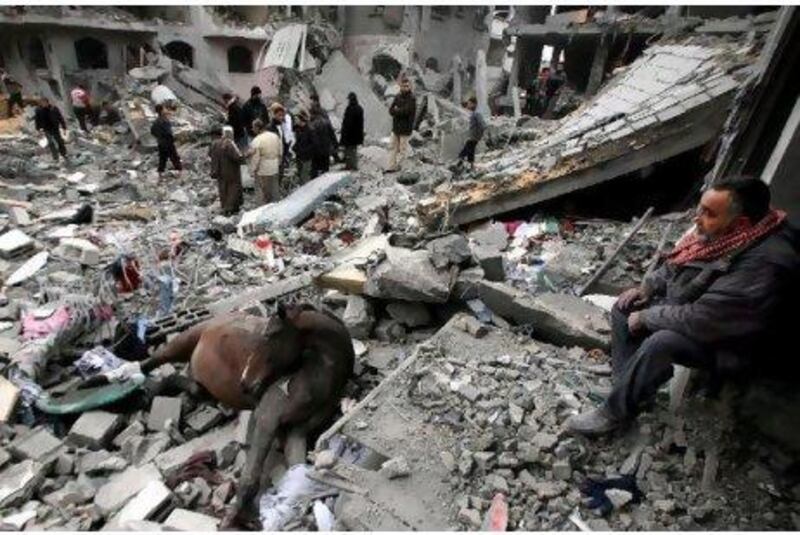JERUSALEM // In return for diplomatic support from the United States, Palestinian leaders reportedly agreed to delay a vote in the United Nations that would have effectively condemned Israel for its 2008 invasion of the Gaza Strip.
The UN Human Rights Council was scheduled on October 2, 2009 to vote in support of the findings of the so-called Goldstone Report. The independent fact-finding team, led by the South African lawyer Richard Goldstone, found that both Israel and Gaza's Islamist rulers, Hamas, had committed war crimes during Israel's three-week attack on the Palestinian territory that began in late December 2008.
But, according to Al Jazeera's "Palestine Papers", Palestinian leaders pushed - and succeeded - in delaying a vote on the measure to March of last year in return for US backing on key issues in peace negotiations with Israel.
The disclosure, published yesterday, is the most recent tranche of roughly 1,600 confidential documents obtained by the network.
They have proved highly embarrassing for Palestinian officials because, in part, of the officials' apparent willingness to make significant concessions in negotiations with Israel.
Saeb Erekat, the chief Palestinian negotiator, yesterday asked the US, Britain and France for help in bringing in three of their nationals in connection with the leak of the documents. Most of them are memoranda written by the Negotiations Support Unit of the Palestine Liberation Organisation.
"We want them to appear before an investigation committee," Mr Erekat said.
Yesterday's disclosures suggest a willingness by the Palestinian Authority (PA) president, Mahmoud Abbas, and his team of negotiators to soften criticism of Israel's invasion, Operation Cast Lead, in return for diplomatic leverage.
As many as 1,400 Palestinians, many of them civilians, died in the fighting, which decimated Gaza's infrastructure. Thirteen Israelis were killed.
US and Israeli officials were highly critical of the Goldstone Report. Under heavy criticism at the time for delaying the measure, Mr Abbas defended his decision by arguing that he had failed to "gather enough support" in the world body.
However, the Palestine Papers suggest different motives. "Thank you for what you did a couple of weeks ago [on Goldstone]; it was very courageous," Jim Jones, a US national security adviser, is reported to have told Mr Erekat three weeks after the measure was initially intended to come to a vote.
The diplomatic quid-pro-quo reportedly involved American support for the Palestinians on Jerusalem.
At a meeting in Washington on October 1, 2009 - a day before the scheduled UN vote - George Mitchell, the US special envoy to the Middle East, told Mr Erekat the US would "explicitly repeat its position on Jerusalem". This included a reiteration by the Americans to not recognise Israel's annexation of East Jerusalem, which Palestinians want as the capital of their future state, as well as opposing house demolitions and evictions in the city.
Mr Mitchell said his government would also lend support in the event of "provocative" measures taken by Israel in the city.
"In such a situation," he said, "with negotiations going on, if [Israel] make[s] a provocative announcement, the US has the leverage to state that this undermines the process, and that Israel is acting in bad faith in the negotiations."
Palestinian leaders are also portrayed as lending support for US foreign-policy objectives in the region to curry favour with Washington.
Mr Erekat is reported to have brandished in front of Mr Mitchell donations by Palestinian businessmen to opposition groups in Iran.
"It's the moment of truth in the Middle East," Mr Erekat told Mr Mitchell during a meeting in October 2009.
Mahmoud Ahmadinejad, the Iranian president, "is in Gaza and Lebanon" and Pakistan is going to become a failed state, he said.
"The Arab states are doing nothing. You know AM [Mahmoud Abbas] had to convince a businessman to pay for Mussawi [sic] to have [a] radio station," he said in reference to Mir Hossein Mousavi, the Iranian opposition leader.
Hamas officials have reacted angrily to the revelations in the Palestine Papers that portray the Palestinian leadership in the West Bank conspiring against it. They show evidence of Mr Abbas interacting with Israeli defence officials shortly before Operation Cast Lead, as well as their co-ordination with foreign intelligence agencies, including Britain's MI6, in conspiring against Hamas officials and supporters.
PA-controlled offices in Gaza were vandalised by unidentified assailants yesterday, and protest rallies erupted across the Palestinian territory a day earlier.
Effigies of Mr Erekat, Mr Abbas and his prime minister, Salaam Fayyad, were reportedly burned at the rallies.





